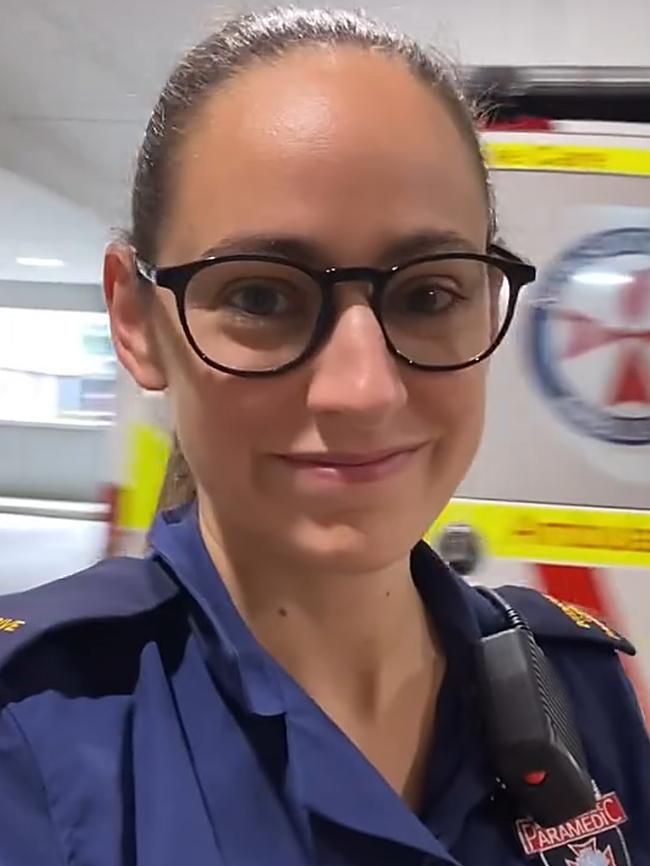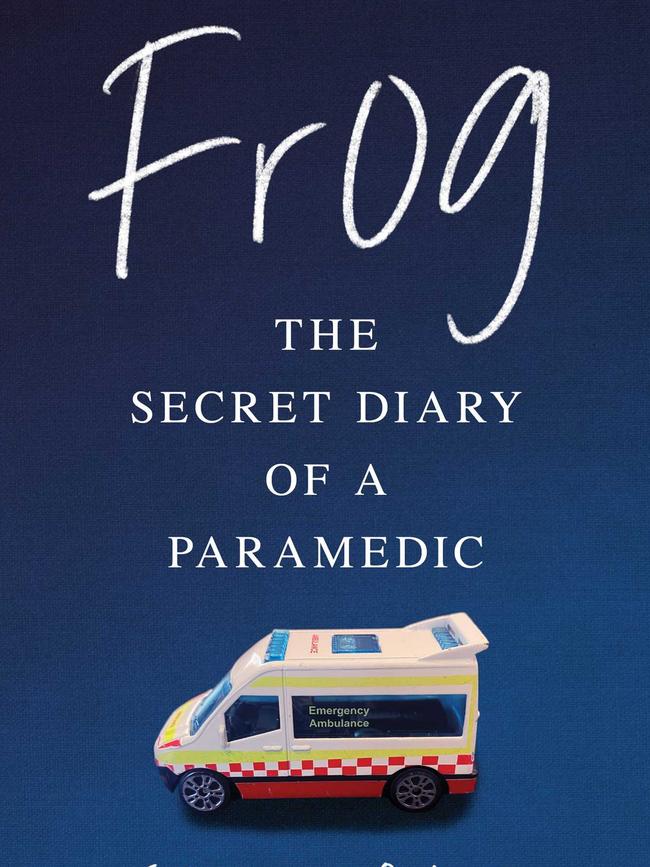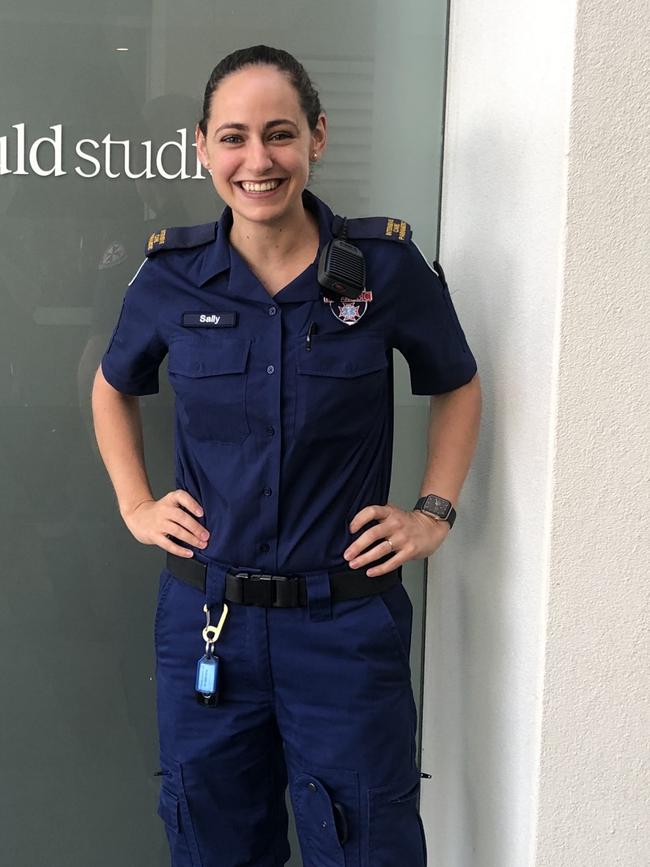I loved my job as a paramedic. How did I get so burnt out?
My career carries baseline risks of PTSD, burnout and depression, with its long hours, night shifts, exposure to human suffering and sometimes abuse. Two years in, after months of tolerating my deranged survival mode, my husband called it.
I was still in my pyjamas – I hadn’t been out of them since I finished my last shift. Showering and getting dressed seemed unachievable and pointless. I should have been out doing a grocery shop, but that was not an option. A dull headache swelled deep in my skull and throbbed behind my eyes. Fresh tears flooded my eyes and clouded my vision, joining a stream and soaking into the already damp cushion under my head. I registered the hot trails they left on my temple. What was wrong with me?
At 23, on the face of things, my life was good. I had a beautiful family, friends, and a job – as a paramedic – that I adored. I had a safe place to live with a loving husband. Only four years prior, I had enrolled at the only university in my home state that offered a degree in paramedicine. High school had fine-tuned my drive for perfection, my desire to leave no room for failure. From early on, I’d been used as the yardstick for success by my classmates, who would expect me to score 100 per cent on everything, or if not, the highest mark in the year by a decent margin. I’d thrown myself into my career with the same sense of devotion.
When I pulled on my work uniform, with it I donned my work persona. I had always enjoyed life as a paramedic, the excitement and purpose, never once thinking, “I have to go to work”, but instead, “I get to go to work.” But at this time in my life, work was the only place where things made sense. It was where I got dribbles of dopamine and had some control. An interesting and unexplainable dichotomy had emerged – Sally in uniform and Sally out of uniform, one person diverging into two identities.

Once in the armour of my uniform, I was able to transform into someone completely different, someone capable. But the metamorphosis was getting harder to execute every week, and the magic of the job was not strong enough to pull me entirely out of the gloom.
I could see my love of work was now an unhealthy obsession, a place where I sought to escape and find relief from instability, an addict seeking a high. But the hit wasn’t working like it used to; I was not my best self at work anymore.
So where did it go so wrong? How had I become such an unrecognisable version of myself? How did I, so determined to shine brightly in a career I loved, become so burned out?
At first, the signs of my condition revealed themselves slowly. For instance, I’d always start a shift with a coffee to get me going, but I found even the caffeine wasn’t doing the trick. I felt constantly grumpy, and eventually I noticed my attitude towards the job, towards the patients, beginning to slip.
I recall a job early in one shift that did nothing to improve my mood: it was a child who “may or may not” have swallowed “something”. And it was two streets away from the local hospital. The mother brought her two-year-old boy out to the street to meet us as we arrived. The kid looked perfectly fine. I listened to his chest and checked over a few other things. His mother explained that he had been playing with older siblings, and she thought he had swallowed something, but wasn’t sure what and couldn’t tell us why she thought so. I wanted to roll my eyes, remind her that she lived practically next door to the hospital, and point out that she could have pushed the child there in a pram and seen a doctor in the time she’d waited for us. I was also tempted to suggest that it was unlikely her child, who appeared fine, had ingested anything of concern. These thoughts circled in my head, but I followed my protocols, which state: “Parental concern is a reason for transport.” So we loaded up and travelled 300m to the emergency department.
As I finished the paperwork, hospital staff pulled my work partner Chris and me into the doctor’s room to look at the boy’s X-ray. There was a sizeable coin lodged in his throat. Simultaneously I was relieved we’d transported him and alarmed at having had my head up my arse. Chris reassured me we couldn’t have known without an X-ray, but I felt embarrassed that I’d doubted the mother’s judgment. I told myself to shake it off and get myself out of this funk.
A few days later, we were on scene with a woman in her sixties. Her family had called an ambulance because she was vomiting. It was near impossible to get a history from her as she sat on her bed, dramatically dry-retching to no avail and generally carrying on. The family wasn’t helping either. They talked over one another – mostly useless statements about how sick their mother felt. We were making no headway, and I was fed up. Frustration drove me to override the conversation and say we needed to get this woman to the hospital, and she needed to assist us in the process. We had already given her medication to help with the nausea, and, armed with a vomit bag, my partner and I reefed her onto her feet. I instructed her to take a few steps to the carry chair. As we wheeled her out, I gruffly reminded her to keep her arms in.

At the hospital, my partner checked on the woman and discovered that a scan had revealed the reasons for her vomiting and noncompliant behaviour. She had a bleed in her brain. Again, I felt a stab of regret. The patient warranted more understanding, and I’d been nothing but a bully. Sure, she needed to be extricated, and my firmness achieved that, but I felt guilty about the lack of empathy I’d shown her and her family members.
Harshness was never my style. I reminded myself to let the anger go and open myself up to a bit more kindness. By now, it was dawning on me that I still looked the same in my uniform, but this person wasn’t me, and things were beginning to feel completely out of my control.
Things come to a head not long after. I remember my new partner, Andrew, and I were on a ridiculous roll of good jobs for the day – a motor vehicle accident (although relatively minor), a paediatric in status epilepticus (having a continuous seizure) and a cardiac arrest, all before midday. “See,” I was telling myself, “every day isn’t rock bottom, and I can be distracted by work; maybe I don’t have a problem.” Perhaps this cloud was disappearing, as unannounced as it had arrived.
As we were finishing a restock of our vehicle, another available crew was called to respond to an incident – a young person had jumped in front of a train. A pang of envy passed through me – I wanted another big job to help me stay in this zone. Andrew and I told Control we were also ready to respond, but instead they sent us on a job for a non-urgent nursing home transfer. I was furious.
Control then assigned us another job, this time for a teenage girl – “threatening suicide” – but from the notes, it didn’t sound as high-stakes or potentially gory or legitimate as the train job had. I gripped the steering wheel and tried to steady myself – my mind was tense. Was this patient just throwing around the term suicide for attention? Or was she harbouring a disturbing secret?
Once at the girl’s house, I went into autopilot, carrying our kits into the home behind Andrew, who entered first as the treating officer. The patient’s answers to his assessment were only half registering – she had fought with her boyfriend and threatened to overdose on pills. Blah blah blah. She hadn’t taken anything. In my mind, morbid and sick, I realised I’d have had more respect for her if she had overdosed. Irrational anger rose within me and was directed at this emotional teenager. She didn’t want to die, she wasn’t going to kill herself. Not even close. I stood silently behind Andrew, using every ounce of restraint I had left, fighting the urge to scream the words running through my head: “If you want to kill yourself, just do it!” But even as that unforgivable thought took form, I knew it wasn’t her I was trying to convince.
I drove home at about 9.40pm after a late job. Completely worn out. It was then that I finally admitted to myself that the personal battle had breached my work persona. For the first time in my career, I doubted I would be able to turn up to work the following day, and I wondered whether, if I did make it in, I would have any proficiency left at all. Maybe I had exhausted my capacity to mask, or perhaps the darkness has grown too expansive, but either way, I realised I was on the brink of losing my only remaining lifeline – my job. The all-encompassing shadow that had been suffocating me was now suffocating the final, most sacred corner of my world.
My husband John eventually called it after months of tolerating my existence in this deranged survival mode. “You need to see someone – you need to get some help,” he said. I had been trying so hard to pass it off as a phase, assuring him and myself that I would get better. His previous attempts at discussion made me angry, defensive and less communicative, but two days later I took a tiny yet monumental step. In the hazy blur that I had come to accept as normal, I sobbed through an appointment with my GP, feeling horrendously weak and helpless. I knew I needed to be there, but there was no sense of relief that I was. She listened, swiftly wrote a mental health plan and referred me to a psychologist.
The psychologist, Lisa, did not ask much about my plans to kill myself, so I did not offer up how well-formed they were. Instead, she began cognitive behaviour therapy with me. She wanted me to complete exercises in mindfulness and activities where I identified the negative thoughts I was having and challenge them. When the subject of our discussions moved on to my job, I said I was sure it wasn’t the cause of my mental state. When I first got sick, I still found reassurance in my work, a glimmer of a reason to stay. I told Lisa how work was integral to my identity: it gives me routine, purpose and an immense sense of achievement – all critical elements of wellbeing. But still she circled, trying to dig up some underlying work-related damage. I was in no place to accept that something I love so deeply, maybe the most, was capable of damaging me.
I stuck with Lisa, despite her assumptions that exposure to trauma at work had made me depressed, and I began to detox my life. The first thing to go was the contraceptive pill, which turned out to be a principal culprit for my depression, as was my regular intake of alcohol. Both were mortal enemies of my brain chemistry. I forced myself to move my body, in the unheroic and basic act of short walks. And slowly, as imperceptibly as it had arrived, the blackness started to recede. The crying lessened, the exhaustion eased, the curtains got opened, and I showered and got dressed myself. The progress wasn’t linear or immediate, but after almost a year of consciously and dedicatedly nurturing myself, the colour returned to my world.
After I emerged from the gloom, I realised that my coming of age, usually a time dedicated to self-discovery and growth, had occurred right there on the frontline in an ambulance. As I formed my work identity, I had failed to develop myself outside my uniform, and failed to manage the expectations of myself as an adult. My career carries baseline risks of PTSD, burnout and depression, with its long hours, night shifts, exposure to human suffering and sometimes abuse. I still adore the job today – some 14 years after I began, and 12 years since I almost lost myself through burn out – and have no ill feelings towards it, but I’ve learned to treat its darker side with respect, and to address the counterweight of self-care that it demands, something I stubbornly resisted for too long.
The job requires resilience, which can only be strengthened by looking after yourself, no matter what outlet you choose to de-stress, unwind or tune out. As for my armour, my uniform, my relationship with it has also evolved. I still have the same pride every time I wear it, but I also have much more understanding that it doesn’t protect me from everything; I know that it’s my responsibility to maintain the health of the human inside it.

A couple of months after finishing the sessions with Lisa, my partner and I were on a job for a 42-year-old man found in a car on the side of the road, screaming, refusing to unlock the doors. I was doing my best to piece the situation together and enter into a conversation with him gently. His answers confirmed to me that he was hurting, depressed, and with little insight left. He got out of the car, and while he sat in my ambulance, the fluorescent lights providing no warmth, I couldn’t stop a tear spilling out and rolling down my cheek. It wasn’t sympathy, but empathy. And while I hadn’t yet found my way back to completely “normal”, I at least had a glimmer of hope that things could shift. Though I knew I couldn’t change this man’s outlook in the ten-minute drive to the hospital, I tried my best.
Once I regained my spark, it was magnificent to reconnect with joy in my personal life and to rediscover delight in my job. I was smitten anew, including with all the silly, small things I’d loved from the beginning: driving on the wrong side of the road, mounting median strips, setting off speed cameras. I also relished once more the uniqueness of being trusted and invited into people’s spaces, reading the cues to best meet their needs.
These days, after ten years of doing night shifts, I usually wake before my alarm, ease out of bed and head straight for the coffee machine. I look forward to my days off, and I’ve got self-nurturing plans – a book to read, brunch with a mother’s group friend, and a scheduled bushwalk on the weekend with my husband and our two kids. I’ve also got dinner planned with my nearest and dearest fellow paramedics.
Over the past few years I’ve found my people and our little crew are well-practised at holding each other up while sharing the burden of what it costs to be a paramedic. At dinner, I’ll look around the table and see some of the most humble yet expert clinicians I’ve ever met, humans I have leant on and supported in equal measure. We provide a place of respite and healing when our armour has been breached, championing one another in work and life. We will tell stories, share our learnings and laugh until our stomachs hurt, and in doing so, normalise the unimaginable.
Frog: The Secret Diary of a Paramedic by Sally Gould (Simon & Schuster) is out now



To join the conversation, please log in. Don't have an account? Register
Join the conversation, you are commenting as Logout